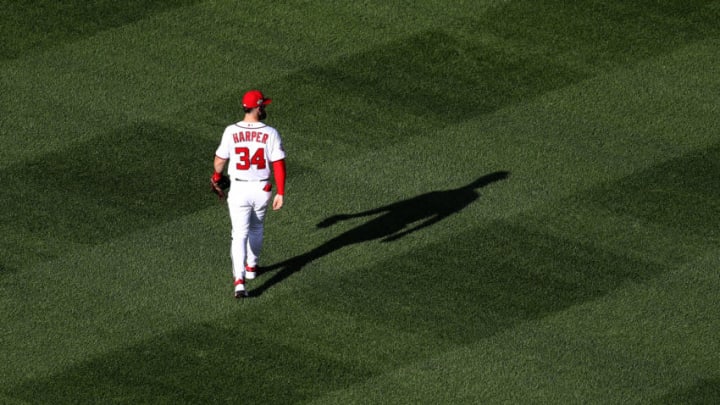Atlanta Braves and the possible economics of Bryce Harper

Butts in the Seats
So yes – let’s take the Braves as a non-random example.
In 2018, SunTrust Park welcomed an average of 31,552 fans to the stadium… at least that’s what the reported numbers indicated… which works out to 76.8% of stadium capacity.
Except the numbers are a bit skewed.
I was at the Opening Day game in 2018. The announced attendance was 40,208, which would have been less than 900 short of a full sellout.
However, I can attest that at no time were even 30,000 people in that stadium. Lots of empty seats in the lower bowl and only a smattering in the general admission seats up top.
In fact, 20,000 might have been about accurate as you can see from this early-game photo:
"Lot of fans came disguised as empty seats today. " pic.twitter.com/XS4oe1pnBr
— AlanCarpenter⚾ (@carpengui) March 29, 2018
Were 40,000+ tickets sold for the game? Most likely, yes. That itself helps the revenue generation, but it doesn’t add the kind of ancillary revenue that bolsters the bottom line.
In-stadium vendors pay a fee for the privilege of having a sales location in the park, but the concession managing company also collects small fees on each sale, which are divvied up with the Braves. More people means more beer, pizza, burgers, … everything.
Ergo, more sales means more revenue, and thus it is in the best interest of the Braves to have more people physically in the stands rather than simply selling tickets to brokers who may or may not get them sold.
Is there a Harper Effect?
How many more bodies would Bryce Harper bring in? That’s certainly up for some speculation, but the number almost certainly is ‘more than zero’ and ‘less than 10,000’. For the purposes of this exercise, I’ll set the guesstimate at 2,000. That’s still a fairly robust number, which would represent a 6% increase above the reported figures and maybe around 10%+ above the average actual attendance.
Some cities would not see a benefit. St. Louis, for a prime example, enjoys a (reported) attendance level of 95.6% of capacity for every game. There’s simply not as many extra tickets that they could even hope to sell, even if they were to sign Harper, Machado, Hank Aaron, and the ghosts of Babe Ruth and Stan Musial.
In addition, there is a playoff impact to consider. As the lowest seeded playoff team in 2018, Atlanta only saw two home playoff dates, though the stadium was actually fully sold out on those nights.
Playoff crowds tend to buy things… food, merchandise… more food… it’s certainly reasonable to guess that the economic impact of a playoff game might be double or triple that of the average regular season contest. If the Braves were to get into a second round playoff series, that adds a minimum of 3 more gates, with the multiplied benefits thereof.
Adding a Bryce Harper to your team does not guarantee such things (see the Nationals’ own playoff success stories over their history), but given the rest of the pieces on certain teams, his presence should at least increase the odds of such a thing happening.
You could argue as well that if the Braves were to get in such a position without Harper, they’d still fill the stadium and gain those benefits regardless (as happened this past October), so I will ignore that impact for the sake of a more conservative guess.